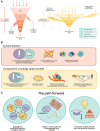Improving Cancer Drug Discovery by Studying Cancer across the Tree of Life
- PMID: 31688937
- PMCID: PMC8204703
- DOI: 10.1093/molbev/msz254
Improving Cancer Drug Discovery by Studying Cancer across the Tree of Life
Abstract
Despite a considerable expenditure of time and resources and significant advances in experimental models of disease, cancer research continues to suffer from extremely low success rates in translating preclinical discoveries into clinical practice. The continued failure of cancer drug development, particularly late in the course of human testing, not only impacts patient outcomes, but also drives up the cost for those therapies that do succeed. It is clear that a paradigm shift is necessary if improvements in this process are to occur. One promising direction for increasing translational success is comparative oncology-the study of cancer across species, often involving veterinary patients that develop naturally-occurring cancers. Comparative oncology leverages the power of cross-species analyses to understand the fundamental drivers of cancer protective mechanisms, as well as factors contributing to cancer initiation and progression. Clinical trials in veterinary patients with cancer provide an opportunity to evaluate novel therapeutics in a setting that recapitulates many of the key features of human cancers, including genomic aberrations that underly tumor development, response and resistance to treatment, and the presence of comorbidities that can affect outcomes. With a concerted effort from basic scientists, human physicians and veterinarians, comparative oncology has the potential to enhance the cost-effectiveness and efficiency of pipelines for cancer drug discovery and other cancer treatments.
Keywords: cancer drug discovery; cross-species studies; evolutionary biology; veterinary oncology.
© The Author(s) 2019. Published by Oxford University Press on behalf of the Society for Molecular Biology and Evolution. All rights reserved. For permissions, please e-mail: journals.permissions@oup.com.
Figures

References
-
- Adams MD, Celniker SE, Holt RA, Evans CA, Gocayne JD, Amanatides PG, Scherer SE, Li PW, Hoskins RA, Galle RF, et al.. 2000. The genome sequence of Drosophila melanogaster. Science 287(5461):2185–2195. - PubMed
-
- Akamatsu S, Wyatt AW, Lin D, Lysakowski S, Zhang F, Kim S, Tse C, Wang K, Mo F, Haegert A, et al.. 2015. The placental gene PEG10 promotes progression of neuroendocrine prostate cancer. Cell Rep. 12(6):922–936. - PubMed
-
- Arrowsmith J. 2011a. Trial watch: phase II failures: 2008–2010. Nat Rev Drug Discov. 10(5):328–329. - PubMed

